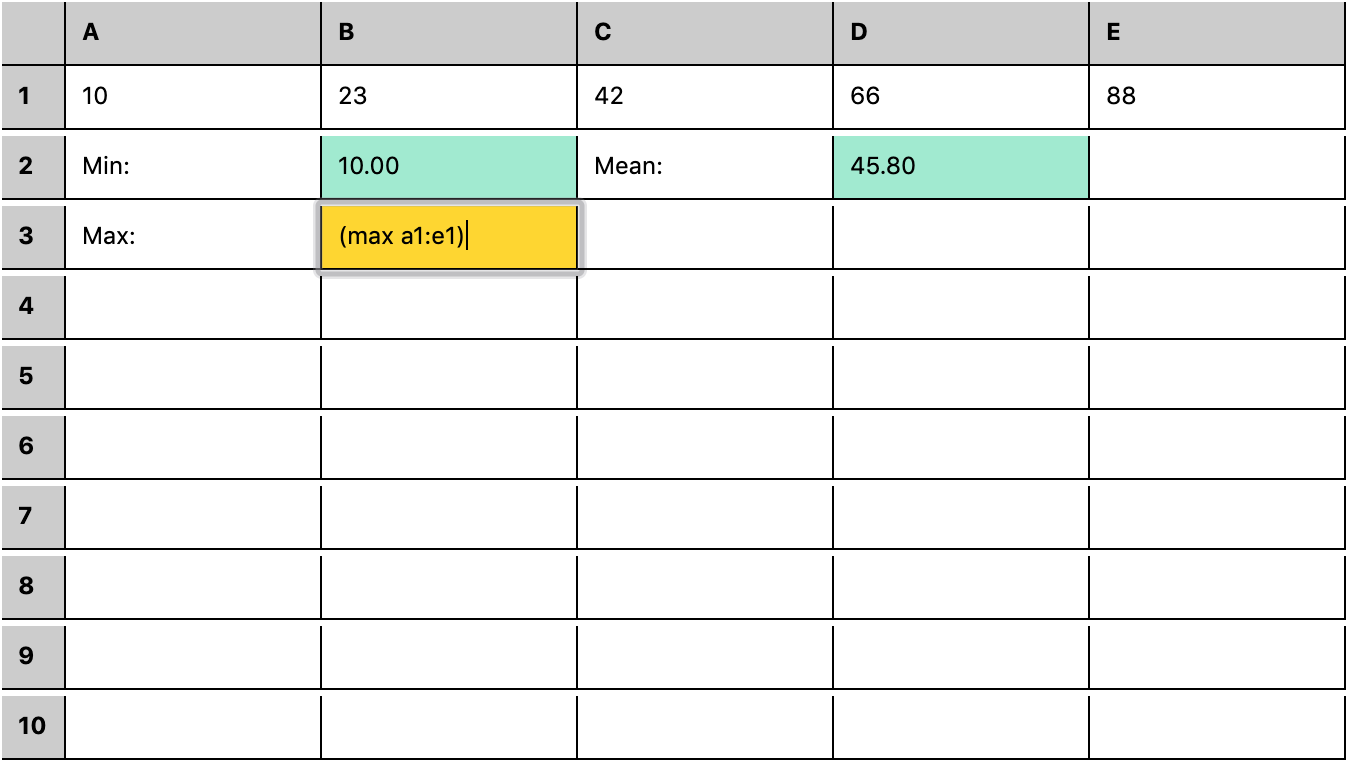This project is part of the @thi.ng/umbrella monorepo.
Basic, but configurable and extensible S-Expression tokenizer, parser, AST builder and runtime / interpreter skeleton for custom, sandboxed DSL implementations.
The following default syntax rules are used:
- whitespace: space, tab, newline, comma
- expression delimiters:
(,) - numbers: any float notation valid in JS, hex ints prefixed w/
0x - string delimiters:
"
Everything else is parsed as is, i.e. as symbol.
ALPHA - bleeding edge / work-in-progress
Search or submit any issues for this package
- @thi.ng/parse - Purely functional parser combinators & AST generation for generic inputs
yarn add @thi.ng/sexprES module import:
<script type="module" src="https://cdn.skypack.dev/@thi.ng/sexpr"></script>For Node.js REPL:
# with flag only for < v16
node --experimental-repl-await
> const sexpr = await import("@thi.ng/sexpr");
Package sizes (brotli'd, pre-treeshake): ESM: 737 bytes
Several demos in this repo's /examples directory are using this package.
A selection:
| Screenshot | Description | Live demo | Source |
|---|---|---|---|
 |
rstream based spreadsheet w/ S-expression formula DSL | Demo | Source |
The tokenize function returns an iterator of tokens incl. location
details. Any whitespace is skipped and whitespace characters are
configurable.
[...tokenize(`(* (+ 3 5) 10)`)];
// [
// { value: '(', line: 0, col: 0 },
// { value: '*', line: 0, col: 1 },
// { value: '(', line: 0, col: 3 },
// { value: '+', line: 0, col: 4 },
// { value: '3', line: 0, col: 6 },
// { value: '5', line: 0, col: 8 },
// { value: ')', line: 0, col: 9 },
// { value: '10', line: 0, col: 11 },
// { value: ')', line: 0, col: 13 }
// ]The parse function takes a source string or iterable of tokens and
parses it into an AST.
parse(tokenize(`(* (+ 3 5) 10)`));
// or directly from string
parse(`(* (+ 3 5) 10)`);{
"type": "root",
"children": [
{
"type": "expr",
"value": "(",
"children": [
{
"type": "sym",
"value": "*"
},
{
"type": "expr",
"value": "(",
"children": [
{
"type": "sym",
"value": "+"
},
{
"type": "num",
"value": 3
},
{
"type": "num",
"value": 5
}
]
},
{
"type": "num",
"value": 10
}
]
}
]
}import { Fn2 } from "@thi.ng/api";
import { defmulti, DEFAULT } from "@thi.ng/defmulti";
import { ASTNode, Implementations, Sym } from "@thi.ng/sexpr";
// multi-dispatch fn for DSL builtins
// we will call this function for each S-expression
// and will delegate to the actual implementation based on
// the expression's first item (a symbol name)
const builtins = defmulti<Sym, ASTNode[], any>((x) => x.value);
// build runtime w/ impls for all AST node types
// the generics are the types of: the custom environment (if used)
// and the result type(s)
const rt = runtime<Implementations<any,any>, any, any>({
// delegate to builtins
expr: (x, env) => builtins(<Sym>x.children[0], x.children, env),
// lookup symbol in environment
sym: (x, env) => env[x.value],
// strings and numbers evaluate verbatim
str: (x) => x.value,
num: (x) => x.value
});
// helper HOF for math ops
const op = (fn: Fn2<number, number, number>) =>
(_: ASTNode, vals: ASTNode[], env: any) =>
vals.slice(2).reduce(
(acc, x) => fn(acc, rt(x, env)),
rt(vals[1], env)
);
// add builtins
builtins.addAll({
"+": op((acc, x) => acc + x),
"*": op((acc, x) => acc * x),
"-": op((acc, x) => acc - x),
"/": op((acc, x) => acc / x),
count: (_, [__, x]) => rt(x).length
});
// add default/fallback implementation
// to allow calling functions stored in environment
builtins.add(DEFAULT, (x, [_, ...args], env) => {
const f = env[(<Sym>x).value];
assert(!!f, "missing impl");
return f.apply(null, args.map((a) => rt(a, env)));
});
// evaluator
const $eval = (src: string, env: any = {}) =>
rt(parse(src).children[0], env);
// evaluate expression w/ given env bindings
$eval(`(* foo (+ 1 2 3 (count "abcd")))`, { foo: 10 });
// 100
// i.e. 100 = 10 * (1 + 2 + 3 + 4)
// call env function
$eval(
`(join (+ 1 2) (* 3 4))`,
{ join: (...xs: any[]) => xs.join(",") }
);
// "3,12"See test/ for a more in-depth version of this example...
// define syntax overrides (keep default whitespace rules)
const syntax = {
scopes: [["<", ">"], ["{", "}"]],
string: "'"
};
parse(`<nest { a '2' b 3 }>`, syntax);{
"type": "root",
"children": [
{
"type": "expr",
"value": "<",
"children": [
{
"type": "sym",
"value": "nest"
},
{
"type": "expr",
"value": "{",
"children": [
{
"type": "sym",
"value": "a"
},
{
"type": "str",
"value": "2"
},
{
"type": "sym",
"value": "b"
},
{
"type": "num",
"value": 3
}
]
}
]
}
]
}Karsten Schmidt
If this project contributes to an academic publication, please cite it as:
@misc{thing-sexpr,
title = "@thi.ng/sexpr",
author = "Karsten Schmidt",
note = "https://thi.ng/sexpr",
year = 2019
}© 2019 - 2022 Karsten Schmidt // Apache Software License 2.0